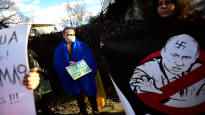According to the Bulgarian journalist, there is history and romanticization of Russia behind Putin’s support. The Russian social media opinion poll and the part of the population in which it is easily immersed play its part.
Recent weeks have seen the EU intensify its ranks as Russia’s invasion of Ukraine progresses. However, there is no information on unity within one EU and NATO country – Bulgaria.
The war in Ukraine is sowing discord and has split Bulgaria into two camps. The country has deep, traditional ties to Russia.
The reasons for the division are various, says the Bulgarian journalist who gave a telephone interview Anelia Dionisova.
– For decades, our people were directed to worship the Soviet Union as a great savior. Older generations have romantic feelings about their relationship with Russia. We have grown up learning that the Russian is “bratushki” or my brother.
– On the other hand, the younger generations and pro-EU people are fed up with a fake history. Meanwhile, the Russian president Vladimir Putin the propaganda machinery works effectively on social media.
A journalist working for Forbes magazine points out that there are also opposing views in Bulgaria.
– The Socialist Party and the pro-Russian Revival have not supported sanctions against Russia, Dionisova says.
“Social media is fighting over whether the war in Ukraine is true or not”
In the first days of the war, Dionisova says that she has taken a close stand with her friend about the situation in Ukraine.
– My friend believes that every word of Putin is true. His arguments repeat word for word Russian propaganda.
– At the same time, he thinks everything we see in the news broadcast by the global media is American propaganda and manipulation.
According to Dionisova, a divided nation continues to fight on social media over whether the war in Ukraine is true or not.
– Very many people believe that the pictures and videos from Ukraine are fake. Bulgaria is a great example of what fake news can achieve, Dionisova concludes.
The journalist himself graduated from the Russian-language high school in the city of Burgas and says he admires Russian literature and art.
– Loving Russian culture is a different matter, I strongly oppose this madness, he emphasizes.
The political field is also in turmoil
According to EURACTIV, an independent online media specializing in EU affairs, between 2020 and 22% of Bulgarians said that 55-58% were positive about Putin’s actions.
However, the war in Ukraine has somewhat weakened Putin’s popularity. According to a recent study commissioned by the Bulgarian state television, positive ratings of the Russian powerhouse had dropped to 32 percent, while negative ratings had more than doubled.
Bulgaria is one of the poorest countries in the EU. However, half of the people are willing to pay the cost of sanctions on Russia, according to a poll, EURACTIV reports.
The previous day, two Russian diplomats living in Sofia had been deported for espionage revelations by the prosecutor’s office.
“Many have already thought about an escape plan”
Dionisova, who lives in Sofia, the capital of the country, says the war has deeply shocked the lives of the whole family.
– Two weeks ago, my 8-year-old son drew cars and cartoons, now only tanks, machine guns and “Save Ukraine” posters appear on paper.
Events are close by. The distance from the holiday town of Varna and the Golden Sands to the Crimean Peninsula is less than 500 kilometers.
Dionisova’s biggest fear at the moment is about the nuclear spill. He believes Putin could deliberately damage Ukraine’s nuclear power plants.
– Many of my friends have made a “grab and go” package and have already thought of an escape plan. If a nuclear disaster occurs, we will be among the first countries on the Black Sea to face a cloud of radiation, he recalls.
Until then, however, most Bulgarians are ready to help refugees from Ukraine.
– Everyone from hairdressers to bankers help. Everyone I’ve talked to in recent days is doing something – small or big for refugees, Dionisova says.
– Some buy food, diapers, medicines or clothes and some share their homes or villas with Ukrainian families, many also volunteer in refugee centers, he describes.
As in Finland, in Bulgaria, volunteers have organized themselves to take care of the transport and temporary accommodation of refugees.
– I have never seen our people so united and so divided at the same time, Dionisova sums up.
You can discuss the topic until Sunday 13.3. until 11 p.m.
